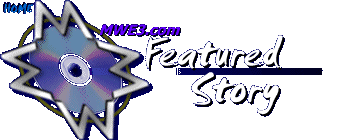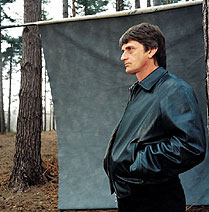 THE
TOP OF THE MORNING...
THE
TOP OF THE MORNING...
the
Mike Oldfield Interview
Thirty
years ago Mike Oldfield arrived on the music scene with his debut
solo album, the ceremoniously titled Tubular Bells. The fact
that it was the first album release on Virgin Records—coupled
with it’s implementation in the original Exorcist movie—made
it among the most auspicious album debut’s from the year 1973.
Having sold well over 15 million units since then, Tubular Bells
has historically proven to be Oldfield's most enduring and popular
work. In the spirit of Tubular Bells several fine ‘70s
solo albums followed, including Hergest Ridge (1974) and Ommadawn
(1975), in addition to a trendsetting 1977 Virgin Records Lp featuring
Oldfield teamed with Finnish bassist / composer Pekka Pohjola. Closing
out the ‘70s with his 1979 album Platinum, Oldfield set
a new standard of musical excellence with his 1980 masterpiece QE2.
One of the most important instrumental rock albums of the past
23 years, QE2—featuring the excellent production of David
Hentschel and key contributions from Genesis drummer Phil Collins—was
the album that catapulted Oldfield into the rock arena and was the
perfect predecessor to his 1982 masterpiece 5 Miles Out. Other
critically acclaimed, vocal-centric rock albums such as Crisis
(1983), Discovery (1984), Islands (1987) and
Earth Moving (1989) followed throughout the ‘80s,
and in 1992 Oldfield—now signed to Warner Music worldwide—released
the long awaited follow up to his original masterpiece, Tubular
Bells 2. Despite having released several key albums on Warners—including
The Songs Of Distant Earth (1994) and Voyager (1996)—during
the second half of the ‘90s, Mike’s music didn't come close
to seeing U.S. release. Although in 2003 that’s about to be changed
and hopefully, it’s a case of better late than never... Firstly,
Oldfield entered the new millennium in style with his 2000 studio
CD masterpiece, The Millennium Bell, released in England at
the end of ‘99. A splendid tribute to honor / enter the
new millennium, the MB CD found Oldfield united with a number
of gifted players including singer Miriam Stockley. As good as The
Millennium Bell CD is, the Millennium Bell concert DVD—entitled
The Art In Heaven Concert—finally released in the U.S.
in mid 2003 on L.A.-based Image Entertainment, really captures the
essence of Oldfield live on stage in Berlin on the evening of December
31st, 1999. Featuring selections from The Millennium Bell CD
and the original Tubular Bells—as well as favorite
Oldfield rockers like “Moonlight Shadow” and “Shadow
On The Wall”, the DVD is further enhanced by an illuminating
interview with Mike.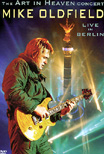 One of the most spectacular concerts and fireworks light shows ever
filmed, the DVD finally gives American viewers the chance to see this
legendary musical icon in rare form. Following the release of his
1998 CD Tubular Bells 3 and the 1999 release of Guitars,
Oldfield returned in 2002 with Tres Lunas—one of his finest,
most assured musical works. Oldfield’s approach to instrumental
rock music has really matured since the heyday of QE2 and 30
years after the initial impact of the original Tubular Bells,
Oldfield is ready once again to unveil his latest masterpiece—a
true to life rerecording of his original instrumental rock classic
called Tubular Bells 2003. Released on CD and 5.1 DVD Audio
on Warner Music in Spain, the album is also finally set for release
in the U.S. on Rhino Records in August 2003. The CD is already creating
quite a buzz among Oldfield followers worldwide and will surely prove
to be among the key music and album events of 2003. During his interview
with Robert Silverstein for 20th Century Guitar and mwe3.com on the
morning of April 14, 2003, Mike discussed the early Virgin Records
years, The Millennium Bell DVD, his guitars and his new recording,
Tubular Bells 2003.
One of the most spectacular concerts and fireworks light shows ever
filmed, the DVD finally gives American viewers the chance to see this
legendary musical icon in rare form. Following the release of his
1998 CD Tubular Bells 3 and the 1999 release of Guitars,
Oldfield returned in 2002 with Tres Lunas—one of his finest,
most assured musical works. Oldfield’s approach to instrumental
rock music has really matured since the heyday of QE2 and 30
years after the initial impact of the original Tubular Bells,
Oldfield is ready once again to unveil his latest masterpiece—a
true to life rerecording of his original instrumental rock classic
called Tubular Bells 2003. Released on CD and 5.1 DVD Audio
on Warner Music in Spain, the album is also finally set for release
in the U.S. on Rhino Records in August 2003. The CD is already creating
quite a buzz among Oldfield followers worldwide and will surely prove
to be among the key music and album events of 2003. During his interview
with Robert Silverstein for 20th Century Guitar and mwe3.com on the
morning of April 14, 2003, Mike discussed the early Virgin Records
years, The Millennium Bell DVD, his guitars and his new recording,
Tubular Bells 2003.
Robert
Silverstein: RS
Mike Oldfield: MO
RS: Mike!
MO: Yes.
RS: It’s Robert Silverstein from 20th Century Guitar magazine
and mwe3.com. How’re you doing today?
MO: Fine thank you.
RS: I want to say top of the morning to you!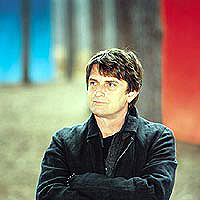
MO: Top of the morning to ya! (laughter)
RS: Where I am anyway. I hope my phone doesn’t break up. I’m
using one of these low-tech Radio Shack jobs.
MO: Telephone? (laughter) Oh, really? It’s not good quality but
I can hear you.
RS:
You can hear me right?
MO: Yeah, it’s alright, yes.
RS: Excellent to be speaking with you! I’m a huge fan of yours.
It’s amazing, we’re the same age now!
MO: Oh...so you know what I’m going through! (laughter) You’re
approaching 50?
RS: I just turned 49 so I’m like nine months younger than you.
You’re approaching another milestone!
MO: Another. Another one, yeah. It starts off at 30 and then 40’s
a big one and then oh my god, 50? What’s that like? Oh well,
we’ll get through it!
RS: I’ve been enjoying your music for just about 30 years and
I want to get to the new Tubular Bells 2003, but first I want
to tell you...the first interview I ever did was with someone I hope
you remember, Pekka Pohjola who I interviewed in Finland at the Sibelius
concert hall during the summer of 1980.
MO: Yes. hmmm.
RS: This may come as a surprise to you, but I still consider Mathematician’s
Air Display, the album you recorded with Pekka and also featuring
your sister Sally, in late 1976 to be one of my fundamental musical
influences. Last year I wrote the liner notes for the Love Records
CD reissue of that album. (editor - reissued on CD in 2002 with the
original Finnish title, Keesojen Lehto)
MO: Oh, did you?
RS: During my 1980 interview with Pekka he told me that you had heard
his second solo album B The Magpie and were pretty impressed
with it and it sort of evolved from there.
MO: It’s a long time ago, you know? I remember I was contacted
by Virgin Records, somebody at Virgin saying that they were looking
for musicians to collaborate with and they suggested this Finnish
bass player called Pekka Pohjola. And first of all, he came to see
me at the Manor and he brought me some black Finnish bread and some
cheese, which I’d never tasted before. It was (laughter) a very
special kind of bread! Then, he was making an album and he came over
with the tapes, to my house and spent three or four days working on
it, playing some guitar, a bit of mixing on it. I think most of it
was already done somewhere, probably in Finland. So he brought the
tape and I just overdubbed on it. Subsequently, when I did my first
big tour, I think it’s in 1979 or ‘78, (I was) looking for
a bass player, so he agreed to come on tour around Europe, a European
tour. A big band there, about 60 people.
RS: That tour was captured on the double Exposed album?
MO: Yeah...I remember I was quite pleased with the track that we did
together. There was one especially that I really liked. I can’t
remember the name of it now.
RS: I think you’re talking about the title track to Mathematician’s
Air Display?
MO: Yeah, could be.
RS: The title track to that album?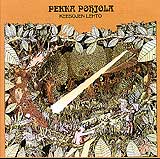
MO: Yes, yes. It could be. I was quite happy with that. I think I
played some nice guitar. I remember there was just a sequence of chords
with a nice bass line. We knitted it all together with the guitar
melody, which was quite nice. And then, after that tour I sort of
lost touch with him! And the last I saw of him was in 1979!
RS: That’s when I first went to Finland to meet him.
MO: Ah.
RS: To my surprise your brilliant guitar performance and production
work on that album paved the way towards the guitar-based rock sound
that would soon became the primary focus of Pekka’s solo albums.
MO: hmmm.
RS: And your sister Sally was great on that album too.
MO: Did Sally sing on it?
RS: Yes on the song “Hands Straighten The Water”.
MO: Yes! (laughter) I couldn’t remember, sorry! I remember the
melody, but I can’t remember the track.
RS: She sang so beautifully on that and then your guitar came in on
then end with this huge crescendo of sound!
MO: Do you know what Pekka Pohjola’s doing now?
RS: After 1979 I started a record label in New York and I released
four of his albums here on Breakthru’ Records. He released a
new album a couple years back. It’s a little different, more
spatial sounding but it’s still quite good. Wow what if I could
hook you guys back up?!
MO: Actually, I think my memory is wrong about that track! Wasn’t
Pierre Moerlin on that track?
RS: Pierre Moerlin played incredible drums on the “Mathematician’s
Air Display”.
MO: Oh! Then I recorded it as well!
RS: You were the engineer as well.
MO: Okay, now I remember, yes.
RS: That album you made with Pekka really changed my life.
MO: Hmmm... (laughter) That sounds positive.
RS: I want to get to the new stuff. But, looking back on the early
years at Virgin Records it kind of seems like a dream. Just the sheer
roster of talent like Robert Wyatt, Hatfield & The North and Gong.
It was awesome. And alot of these guys, Robert Wyatt and Fred Frith
and Steve Hillage were buddies of yours.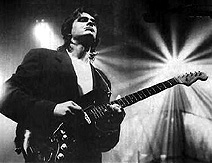
MO: Well, I certainly remember Robert Wyatt. Of course, I was the
bass player in Kevin Ayers And The Whole World and he joined us for
nearly six months or so. So, I was playing bass to his drums which
was quite an experience. And it was just great because he’d be
playing along in a really good feel and everything and just suddenly,
he’d go crazy and he’d be playing it like it was an avant
gard percussion instrument! I would have to keep the bass line going
to keep the song going and wait until he’d decide to rejoin the
rhythm, which he would do beautifully, he’d come straight back
into it. It was completely unpredictable and he was a wonderful drummer.
RS: He was brilliant.
MO: He really was.
RS: I love the Soft Machine, especially Volume Two...
MO: There was a beautiful film, I don’t know whether you’ve
seen it in New York. It’s a French film. It’s about the
migration of geese. It’s called Le Peuple De Immigranteur
and Robert Wyatt’s music is featured on it quite a bit. Very,
very beautiful film. Just released in France last year.
RS: Everyone on Virgin was making such great music. You couldn’t
choose sides. Simon Draper helped Richard Branson find some of those
great artists for the Virgin label. Could you say something about
Simon?
MO: Well it was Simon Draper who really gave me my first opportunity.
‘Cause he was Richard’s partner along with another guy called
Nick Powell, in the very early days. And it was Simon who really...he
said, ‘okay, let’s give this guy Oldfield a chance’.
And in the early days, he was very supportive. Then, I haven’t
heard from him since Virgin was sold to EMI, and then what he does
now. He was the real day to day boss at Virgin where as Richard was
more the public relations sort of thing and business. Simon dealt
with the musicians and the music.
RS: I don’t want to dwell too much on Virgin Records but then
I started thinking that without Tubular Bells I might not have
gotten to hear Pekka Pohjola’s music.
MO: No, I suppose if Tubular Bells had not been successful
perhaps they’d have missed out on all that and gone straight
to punk! (laughter)
RS: Imagine that. Would’ve changed my whole career!
MO: Changed your life!
RS: Because after that mid to late ‘70s burst of creative brilliance,
the more interesting your music became, the less interesting Virgin
Records became.
MO: Well, it’s very nice of you to say that, thank you.
RS: Your version of Jerry Lordan’s “Wonderful Land”
from QE2, which I first heard in June of 1981, was the song
that single handedly introduced me to the music of The Shadows.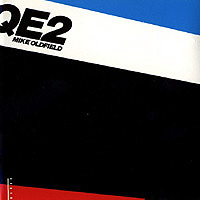
MO: Oh! The Shadows! I tell all these people the only guitarist I
ever wanted to meet in my whole life was Hank Marvin. And I finally
did one day!
RS: I was living in Sweden in early 1981. I had been there several
times in '79 and '80 and in April 1981 I moved there. I was pretty
shattered by Lennon’s 12/8 murder. I had just moved into a new
apartment a few blocks away from the Dakota... next to Lincoln Center,
where my family owned a restaurant, I was reading you arrived in NYC
the day he was killed?
MO: Yeah, it was just one of those coincidences...you know? My
first trip I think, or second trip. I came there to do a bit of...I
hired some session musicians and we worked on an album that became
called Platinum. I was just looking at your web site here,
tcguitar.com.
I just recognized two of my guitars straightaway from there. The wooden
Telecaster which is what I used on Tubular Bells mostly. I’ve
got Marc Bolan’s old Telecaster. And the pink Stratocaster which
I use kind of alot. It’s funny, it’s got two of my favorite
guitars straightaway.
RS: So you arrived in New York on December 8th?
MO: Yes, I arrived that evening, yeah. (big sigh)
RS: That’s like, uncanny almost.
MO: Yeah, isn’t it?
RS: Bo Hanson guitraist Kenny Håkhanson told me about Hank Marvin
in Stockholm the Spring of 1981 and then his friend Stig Vig from
the pop group Dag Vag played me QE2 and I heard your version
of “Wonderful Land”. And I said ‘what is that?’
MO: Hmmm. That was a big hit in Australia for some strange reason.
I don’t know why! (laughter)
RS: QE2?
MO: Yeah, they liked that in Australia. My version of “Wonderful
Land”. Suddenly I was very hot in somewhere like Adelaide!
RS: After I heard your version of “Wonderful Land” I heard
the Shadows’ version and the nostalgia element was just so incredible.
Just at that moment it really opened me up to The Shadows.
MO: Hmmm.
RS: Anyway, I always wanted to thank you for making that incredibly
beautiful version of “Wonderful Land”—that song just
about saved my life in 1981. In retrospect what made you choose to
cover “Wonderful Land” in 1980?
MO: Hmmm. Well, it could have been Simon Draper! I was a couple tracks
short for the album and I asked him if he had any ideas and I think
he said, ‘why don’t you try doing a version of that.’
RS: I guess The Shadows always had a huge influence on you...
MO: I was very young. 10, 11, 12...and I saw Hank Marvin and I thought,
‘God, I want to be like that!’ (laughter) But I wasn’t
so tall and thin and I didn’t wear glasses, but I’d got
the guitar anyway.
RS: After Kennedy got killed it was like we were saved by Beatlemania
and we never heard The Shadows here.
MO: Really.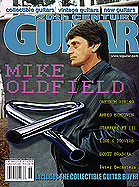
RS: I think the first instrumental rock album from England that had
an impact here in America was Tubular Bells.
MO: Was it?
RS: What did you think about the Shadows’ cover of your 1983
hit “Moonlight Shadow”? (ed. - In fact they called the 1984
album it appeared on Moonlight Shadows!)
MO: Oooh! I was very pleased about that! I still hear that sometimes,
in restaurants. They have this Shadows’ compilation album. So,
I’ll wait for my check to come along. Yeah! It was great, yes.
RS: Did you ever get to speak to Hank about that or “Wonderful
Land”?
MO: Yeah, I met them at a theater one day. We were on the same show.
I met Bruce...was it Bruce Welch? Yes, Hank Marvin and all that...he
told me they’d done a cover. I said, ‘I know, I heard it,
very nice’.
RS: I know Hank lives in Australia now.
MO: Yeah.
